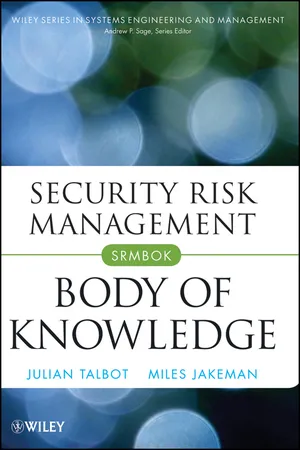
Security Risk Management Body of Knowledge
Julian Talbot, Miles Jakeman
- English
- ePUB (apto para móviles)
- Disponible en iOS y Android
Security Risk Management Body of Knowledge
Julian Talbot, Miles Jakeman
Información del libro
A framework for formalizing risk management thinking in today¿s complex business environment
Security Risk Management Body of Knowledge details the security risk management process in a format that can easily be applied by executive managers and security risk management practitioners. Integrating knowledge, competencies, methodologies, and applications, it demonstrates how to document and incorporate best-practice concepts from a range of complementary disciplines.
Developed to align with International Standards for Risk Management such as ISO 31000 it enables professionals to apply security risk management (SRM) principles to specific areas of practice. Guidelines are provided for: Access Management; Business Continuity and Resilience; Command, Control, and Communications; Consequence Management and Business Continuity Management; Counter-Terrorism; Crime Prevention through Environmental Design; Crisis Management; Environmental Security; Events and Mass Gatherings; Executive Protection; Explosives and Bomb Threats; Home-Based Work; Human Rights and Security; Implementing Security Risk Management; Intellectual Property Protection; Intelligence Approach to SRM; Investigations and Root Cause Analysis; Maritime Security and Piracy; Mass Transport Security; Organizational Structure; Pandemics; Personal Protective Practices; Psych-ology of Security; Red Teaming and Scenario Modeling; Resilience and Critical Infrastructure Protection; Asset-, Function-, Project-, and Enterprise-Based Security Risk Assessment; Security Specifications and Postures; Security Training; Supply Chain Security; Transnational Security; and Travel Security.
Preguntas frecuentes
Información
1
Introduction and Overview
1.1 WHY SRMBOK?
1.1.1 Key Challenges
- Who is responsible for the risk assessment?
- Who is responsible for managing risk?
- How should alternative courses of action be developed, and how should they be evaluated?
- How does one perform cost/benefit analysis on an abstract problem where potential consequences are astronomical but probability is unknown and may be close to zero?
- How should terrorist and criminal adaptive responses to security measures be taken into account as potential security measures are being considered?